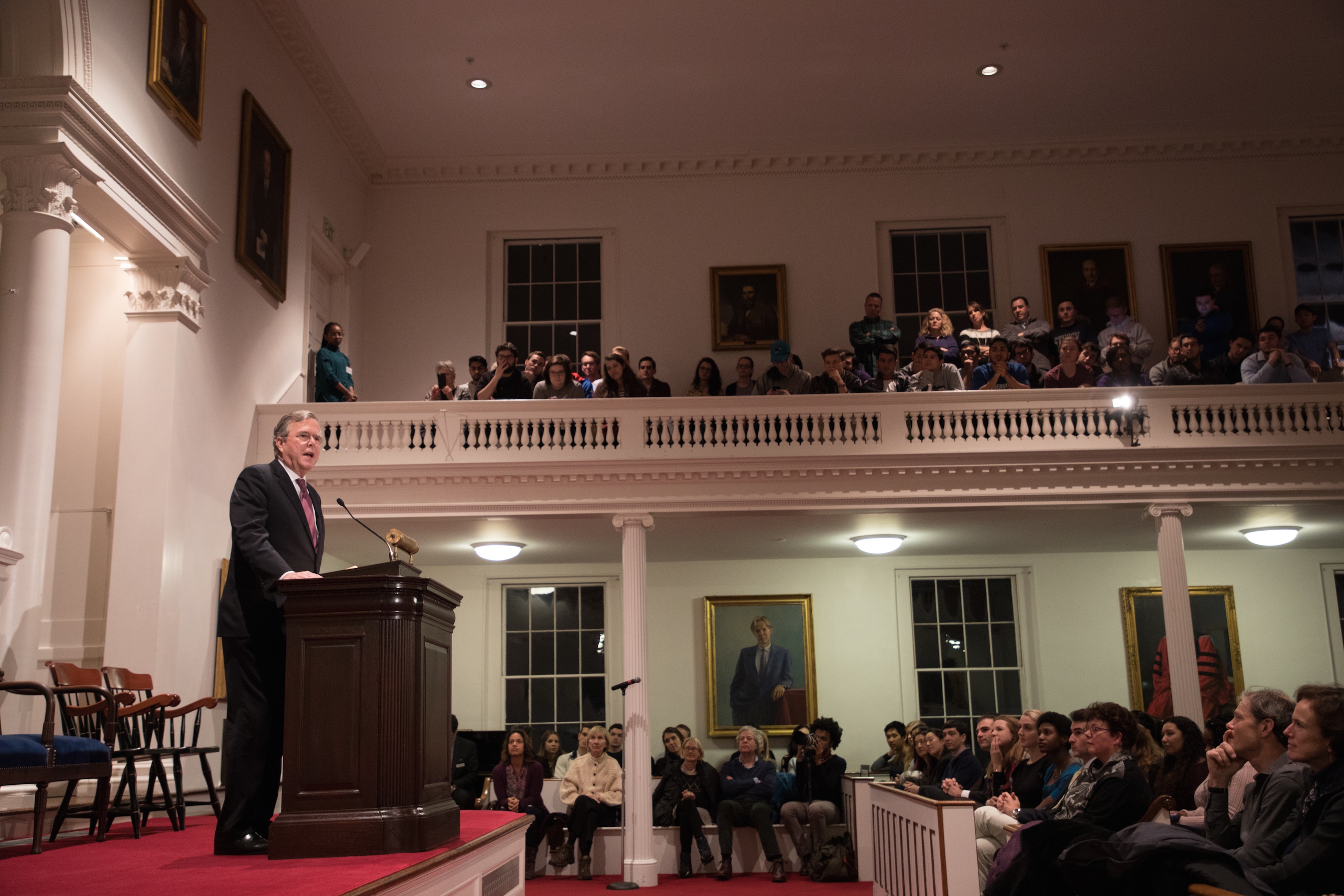

Former Florida Governor Jeb Bush addressed the Amherst community in Johnson Chapel on Tuesday, Jan. 31, covering issues such as immigration and education reform.
The talk was free and open to members of the public, and streamed online and in Stirn Auditorium for overflow audiences.
Bush served as the 43rd governor of Florida from 1999 to 2007 and is now the chairman of the Foundation for Excellence in Education, an organization that works on education reform throughout the United States of America. He was also a visiting fellow at the Harvard Kennedy School last fall.
After an introduction by President Biddy Martin, Bush began by discussing his personal relationship with the topic of immigration.
“The fact is, I come from an immigrant family,” said Bush, speaking about his wife, an immigrant from Mexico, as well as his children and grandchildren and their multiethnic heritage.
Bush continued his talk by discussing the shifting views regarding the “American dream.”
“The right to rise in this country has always been a hallmark of … what the American experience has been defined by,” Bush said. “If you work hard, play by the rules, you can achieve anything you want to … A whole lot of people don’t think that’s the case anymore.”
Many Americans no longer believe that their children will have more opportunities than they did, which was unusual, he added.
He added that Americans are “deeply divided, and … don’t believe the future is one of great abundance and great possibilities for our country. And it can be, but we need to start fixing the problems that exist.”
Bush further emphasized the value of a strong K-12 education, noting that the U.S. spends more money on education per student than any other country except for Belgium, the Netherlands and Luxembourg, while only around a third of students meet benchmarks for college and career readiness.
“In this country, we have not had a real command focus on early childhood literacy,” Bush said, which he believes should be a value for all Americans.
“We’re dooming kids in the world we’re moving towards … We need to have robust accountability around every child,” said Bush. “It boggles my mind that … [there is] no marching in the street for kids on the behalf of our society, that are not learning.”
In addition, Bush talked about how many working-class Americans’ economic woes resulted from technological advancement replacing many jobs, rather than having those jobs leave the U.S. for other countries.
He also spoke on how the state of the American economy related to the issues of immigration and accepting refugees.
Bush emphasized the “increasing numbers of people ... being left behind … [which] will have an impact on all of us. We have a duty … to recognize that this is the great challenge of our time.”
The talk was followed by a series of questions from the audience, which covered topics such as Bush’s unsuccessful 2016 presidential primary campaign, protection of voting rights and the death penalty.
Mayowa Tinubu ’20, who attended Bush’s talk, was “interested in hearing a conservative voice” on campus.
“I consider myself a liberal, but I don’t think there’s anything inherently wrong with being a conservative,” Tinubu said. “College is supposed to challenge people intellectually, and drowning out one side of political views is not conducive to intellectual growth.”
Before the talk, Bush held a special private class in the Alumni House with 25 students, who were randomly selected from a pool of online applicants.
Noah Elliott ’19 attended the private class, which consisted of an hour-long question and answer session, and said that he enjoyed the opportunity to hear from Bush in a smaller, more personal setting. “In a more large-scale setting … it’s kind of hard to really understand where he comes from and why he believes what he believes,” he said.
Fernando Garcia Toro ’20, who attended both the class and the main talk, said he felt people at Amherst “aren’t very open to ideas … that don’t reinforce the ones they already have.”
“So I think it’s important to have someone like Jeb,” he said. “Even if they don’t accept them, at least they’ve heard them.”